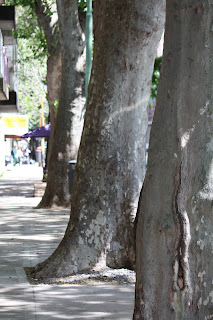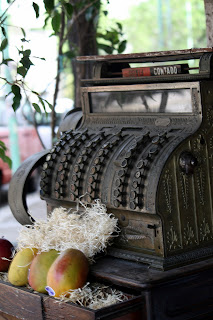While wandering off the main tourist paths, we chanced upon a small shop with a display of beautifully carved forcale, the word for the part of the gondola against which the gondolier places his oar to maneuver the gondola. There were also small wooden replicas of the ornament, the ferro (usually made from iron), that is on the front of the gondola. We went inside the shop to see about purchasing one, and the owner came out from his adjoining workshop to greet us. (This is where having a husband fluent in Italian comes in really handy!) We showed him what we were interested in and asked him about his work. For the next twenty or thirty minutes, he explained how the forcale is used in the same way a driver would use the accelerator, brakes and gears in a car, the gondolier positioning his oar against the forcale differently, depending on his speed or direction.
He is one of only three craftsmen in Venice to painstakingly carve these pieces essential to every gondola. He pointed out that the one in the window was destined for display in Austria while others he had created were in various museums around the world. That particular one was considered a matrimonio, specially decorated for a wedding. They are also used in everyday gondolas. This man's passion for his art and craftsmanship was evinced in every word and gesture, not to mention the fact that he told us he works on each forcale for 10-12 hours a day for five or more days.
After our purchase and effusive thanks for his gift of time, we headed farther off in a quieter area where we spied the workshop where the gondolas themselves are repaired. The men had closed shop for lunch, but we could see they had plenty to do later.


We learned, too, that the colorful poles where gondolas are tied up represent different villas -- or hotels, now that many of the former palazzi have been sold to them.
Finally, the gondolas would be nothing but strangely shaped watercraft, were it not for the gondoliers.























































